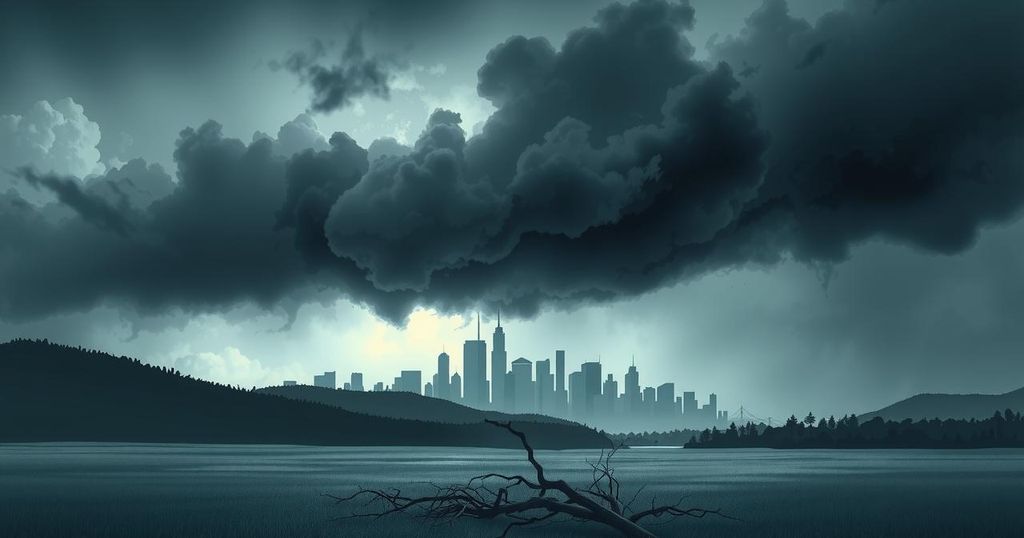World news
AFFAIRS, AFRICA, AP, CONGO, CONGO (KINSHASA), COOPERATION, COUNCIL, DEMOCRATIC REPUBLIC OF THE CONGO, GOMA, INTERNATIONAL COOPERATION, INTERNATIONAL RELATIONS, MILITARY, NATIONS, RWANDA, SECURITY, SECURITY COUNCIL, THERESE KAYIKWAMBA WAGNER, THÉRÈSE KAYIKWAMBA WAGNER, UNITED NATIONS, WAR, WEST AFRICA, YUKI IWAMURA
Fatima Khan
0 Comments
Fear and Uncertainty in Goma as Rwanda-Backed Rebels Claim Control
Residents of Goma, Congo, experience fear as Rwanda-backed M23 rebels claim control of the city amidst ongoing violence. This situation heightens concerns for regional stability, which is already affected by significant humanitarian crises. The U.N. Security Council has condemned the rebels’ actions and called for urgent withdrawal. Congolese officials have declared a state of war, dramatically impacting the population as many flee in search of safety.
Goma, Congo, has been engulfed in fear and uncertainty after Rwanda-backed M23 rebels asserted they had taken control of the city amidst intensifying clashes. Gunfire echoed through the streets as unidentified armed men adorned in military garb paraded through Goma. Some local residents cheered them on, but the Congolese government has yet to confirm the rebels’ claim of capturing the city, exacerbating the ongoing conflict within this historically war-torn region.
The M23 group, supported by Rwanda, is part of a larger struggle involving approximately 100 armed factions contending for influence in this mineral-rich area. The group had previously seized Goma in 2012 and re-emerged in late 2021, with increased reported backing from Rwanda, which the Rwandan government disputes. The escalating violence threatens to destabilize a region that is already overwhelmed by one of the largest humanitarian crises, with over six million people currently displaced.
In a recent statement, the U.N. Security Council urged the M23 rebels to withdraw their military advances as they condemned violations of the Democratic Republic of the Congo’s sovereignty. Tensions have escalated following the rebels’ announcement of their capture of Goma, coinciding with a deadline for Congolese forces to surrender their weapons. The situation remains precarious as officials from the Congolese government assert the current environment constitutes a state of war, severing diplomatic ties with Rwanda amidst continued hostilities.
Residents of Goma have begun evacuating the city amidst the violence. Reports indicate that hundreds fled overnight, carrying their possessions to seek safety in neighboring Rwanda. Eyewitness accounts illustrate growing fears among residents, with one person recounting seeing soldiers on the border engaging in combat. The U.N.’s special representative for Congo highlighted the urgency of the situation, indicating that escape routes have been severely compromised.
The conflict has resulted in tragic losses, including the deaths of at least 13 U.N. peacekeepers in recent days. The U.N. peacekeeping mission in the Democratic Republic of the Congo remains one of the largest globally with around 14,000 forces deployed. Reports also suggest that numerous Congolese soldiers are abandoning their posts amid the escalating crisis, heightening the need for immediate intervention and a resolution to the ongoing conflict.
The conflict in eastern Congo, especially in North Kivu province, is rooted in decades of instability and violence spurred by various regional and international factors. The M23 rebel group has repeatedly challenged the authority of the Congolese government, leading to significant humanitarian crises with millions displaced. Rwanda’s involvement complicates the situation further as accusations of support for the rebels have persisted despite Rwanda’s denials. The region’s mineral wealth has perpetuated this cycle of conflict, drawing in numerous armed factions vying for control. The deteriorating security situation highlights the urgent need for resolution and cooperation from regional actors, particularly as the United Nations continues to monitor the developments closely. Diplomatic efforts to stabilize the area have often faltered, raising concerns about the future of peace and security in the broader region.
The situation in Goma underscores the fragility of peace in eastern Congo amid escalating violence by the M23 rebel group. With fears of further instability rampant among residents and an increasing death toll among peacekeepers, the region’s humanitarian crisis appears poised to worsen. Calls from the U.N. for a ceasefire reflect the international community’s awareness of the dire implications if the conflict remains unaddressed. Urgent diplomatic engagements and comprehensive strategies are necessary to restore peace and ensure the safety of affected populations.
Original Source: apnews.com




Post Comment